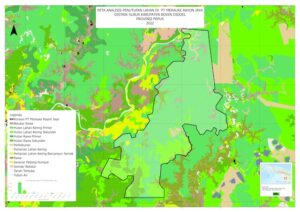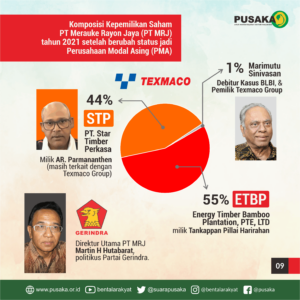Unproductive Forest, these words are written and contained in several official legal documents of the government to indicate the condition of forest vegetation and stands based on the technical criteria and foresters’ knowledge, such as scarce and insufficient tree stands, and certain tree sizes.
The state foresters’ knowledge is used by the permit issuing officials, consultants and company operators, by accusing and dictating the existence of customary forests as unproductive forests, and therefore must be converted into productive through commercial businesses, industrial forest, plantation and agricultural cultivation businesses, to gain profits.
The Wambon Tekamerop indigenous community in Subur District, Boven Digoel Regency, has been living for generations within and around the forest. They refute the state foresters’ and companies’ knowledge, namely that the arguments of unproductive forests and vacant land had served as basis for granting industrial plantation forest business permits to a company, PT Merauke Rayon Jaya. This policy is a form of neglect of the state and corporations that do not recognize and respect the rights and knowledge of indigenous peoples.
In 2021, PUSAKA and the Wambon Tekamerop indigenous community in Aiwat Village, Subur District, conducted an assessment of the forest area condition based upon local customary knowledge. The logical fallacy on customary forest and indigenous community’s knowledge can be refuted with the fact that the indigenous community possesses innovative knowledge in managing and utilizing the forest in a sustainable manner. The condition of the local forest is still considered sound and still able to provide for all of the community’s needs. The forest which belongs to the Wambon Tekamerop tribe is occupied by simple vegetations (lichens and ferns) up to woody plants and it became a dwelling place for wild animals. The forest is still filled with various woody tree (with a diameter of more than 40 cm) and non-woody tree species, which can be utilized by the people as foodstuff, medicinal plants, cultural accessories materials and as building materials.
The names of the plants often utilized by the people for house materials, foodstuff, medicines and customary ceremonies, and food for wild animals, are: doruk (Vatica rassak), tenot (Gnetum gnemon), keydan, mbu, oromun, moron, terah (Calamus sp.), jon (Oncosperma tigillarium) and ndu (Metroxylon sagoo). The people still possess knowledge of their forests because their lives are still dependent on the forests and such knowledge is contained in the customary norms of the management and safeguarding of their customary forest.
Industrialization of Natural Forests on a Large Scale
In 1998, the Minister of Forestry issued Decision Letter Number 5/KPTS-II/1998 dated 05 January 1998 regarding the granting of concession right of Pulp Industrial Plantation Forest (HTI) to PT Maharani Rayon Jaya (MRJ), which later changed its name to PT Merauke Rayon Jaya, for an area of 206,800 hectares, which is administratively located in Subur District, Boven Digoel Regency and Muting District, Merauke Regency, Papua Province.
PT MRJ’s plantation forest industrial business permit had been revoked by the Regent of Merauke in 2007, the Governor of Papua in 2013, and the Minister of Forestry in 2014. However, the company sued against the Minister of Forestry’s decision and the panel of judges at the Supreme Court in the judicial review case hearing accepted the company’s lawsuit and annulled the Minister of Forestry’s 2017 decision. Subsequently, the Minister of Environment and Forestry (LHK) issued SK Number 238/Menlhk/Setjen/Kum.1/5/2018 dated 17 May 2018 which annulled and reinstate PT MRJ’s business permit.
PT MRJ planned to convert the natural forest stated as unproductive forest and vacant land, into plantation forest industrial for pulp commodity.
Based on the HTI Business Work Plan for a 10 (ten)-year period of 2020 – 2029, PT MRJ will clear natural forests and plant the solomon teak and sengon solomon teak species on an area of 152,974 hectares, or approximately 74 percent of the 206,800 hectares concession.
The new solomon teak and sengon plants are not endemic plants, they are brought from outside, and will replace and eliminate the diversity of tree plant species in the customary forest.

Threat of Deforestation
Based on the moratorium map (PIPIB, 2019) and the land cover map, it is identified that PT MRJ’s concession area predominantly consists of primary natural forests with a total area of up to 131,314 hectares and there are peat lands in a total area of 2,020 hectares. Therefore, the natural forest area here had become an object of moratorium. In 2022, the PIPIB Map (2022) was revised, the remarks on natural forests and peat lands in PT MRJ’s area are no longer found.
From the results of study by PUSAKA, the customary forest area which became PT MRJ’s company concession area is dominated by forest areas with high conservation value (NKT) of category 2.2., namely a natural area which contains two or more ecosystems. This vast landscape has the capacity to maintain the ecological processes and dynamics. There is also a category 3 NKT area, that contains a rare ecosystem which is threatened to extinct. In addition to NKT 2 and 3, the Wambon tribe’s forest area is also classified in NKT category 6 – an area with significant role for the communities, namely douval sacred forest, sacred grave area, old village and antiquated village areas.
It is estimated that if PT MRJ carries out conversion on the natural forest concession of an area of 2,068 Km2, the natural forest lost (deforestation) would be 11 times the area of Stockholm in Europe, the city where the UN General Assembly Conference (1972) was convened, that established the World Environment Day, which is commemorated every June 5th. The potential carbon (CO2) emission from such deforestation is 146,624,737 tons of CO2.
The plantation forest industry project which will lead to deforestation is in contradiction to the government’s commitment to reduce emission and prevent climate change. Ideally, the government protects and empowers the indigenous communities in the management of customary forests in order to actualize the sustainable development principle.
New Investor
The company, PT. Merauke Rayon Jaya, was established in 1995 and is domiciled at Jl. Proklamasi Number 36, Pegangsaan, Menteng, Central Jakarta. Initially, PT MRJ was part of Texmaco Group, the shares of which are predominantly owned by Marimutu Sinivasan. After facing financial and legal issues, being involved in the Bank Indonesia Liquidity Assistance (BLBI) case, the government subsequently seized the assets of Texmaco Group controlled by Marimutu Sinivasan. Such seizure will be followed by open sale or auction and or other settlements, said the Minister for Political, Legal and Security Affairs Mahfud, MD (20/01/2022).
Based on the company data issued by the Directorate General of General Legal Administration of the Ministry of Law and Human Rights accessed in June 2022, it was discovered that in 2021 there had been changes in the Articles of Association and Company Data of PT Merauke Rayon Jaya, namely the company type from a Domestic Investment (PMDN) into PMA (Foreign Investment Company). PT Merauke Rayon Jaya is owned by a new investor from Singapore, Energy Timber Bamboo Plantation, PTE, LTD, a holding company owned by Tankappan Pillai Harirahan, which controls PT MRJ’s shares by 55%, PT Star Timber Perkasa, which is owned by AR. Parmananthen (still related to Texmaco Group) by 44%, and Marimutu Sinivasan 1%. The President Director of PT MRJ is Martin H Hutabarat, which is a prominent politician from the Gerindra Party.
The Wambon Tekamerop indigenous community, the owner of the land, did not receive any information on such change and the presence of a new investor in PT MRJ. The government should have placed PT MRJ as one of the companies whose permits need to be evaluated and imposed with sanctions. As stated in President Joko Widodo’s speech, “Permits which are not implemented, not productive, transferred to other parties, and not in accordance with the designations and regulations, will be revoked”. (January 2022).

The Community’s Resistance
The Indigenous Community of Wambon Tekamerop Tribe in Subur Village and Aiwat Village was never aware of any permit process until PT Merauke Rayon Jaya (MRJ) obtained the business permit. The government and the company never conducted any open and extensive socialization. The community complained about PT MRJ’s business plan which will clear out the remaining customary forest and deprive the Wambon Tekamerop tribe of their sacred grounds, which among other things is related to the history of presence and journey of the Catholic Mission in South Papua.
On PT Merauke Rayon Jaya’s plan, the indigenous community of Wambon Tekamerop tribe as the owner of the customary land has carried out resistance by sending a letter of statement of rejection to the plan and a mediation with PT MRJ (2019); they had a meeting with the company and expressed their rejection (2020); the Wambon Tekamerop Indigenous Community conducted customary rituals, planting Red Crosses and Barricades on the Wambon Tekamerop customary areas to safeguard the forests and customary areas (2020), they had an audience with the officials representing the Governor of Papua, the Forestry Service Office, MRP Papua (2021).
The Wambon Tekemerop community demands : (1) The regional and national governments should not issue any recommendation latter and they should revoke the company license of PT Merauke Rayon Jaya; (2) The regional and national governments must honor the decision of the Wambon Tekamerop indigenous community of rejecting all industrial plans and activities of PT MRJ in Subur Village and Aiwat Village, Boven Digoel Regency; (3) The Ministry of Environment and Forestry should promptly grant recognition of the customary forests controlled and managed by the Indigenous Community of Wambon Tekamerop Tribe in Subur Village and Aiwat Village, Subur District, Boven Digoel Regency, Papua Province.
Ank, Jul 2022


